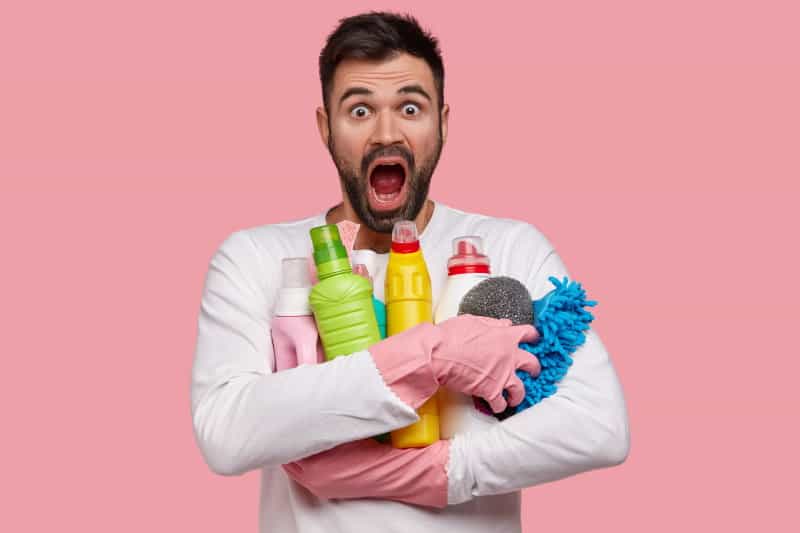Caring for a beard is an extension of caring for your whole body. Bathing, grooming, moisturizing, styling – these are all important components to feeling your best. Your goals are to look good and feel confident, and smelling nice is a huge part of that process. So, how do you explain a smelly beard?
There are several common factors that contribute to funky facial hair: bacteria, environment, bodily secretions, food oils, and expired grooming products. But fret not! There are easy ways to mitigate these vile agents and return your beard to a sweet-smelling state.
With that in mind, let’s look at five usual suspects for beard stink. We will help you identify the most likely culprit for your odorous facial hair and give you tips for fixing the funk.
Culprit #1 – Beard-Born Bacteria
All beardsmen know that facial thickets are a literal net to catch bacteria. In fact, Oregon-based craft brewer Rogue Ales, released a beer a few years back that was fermented with a unique culture harvested from the brewmaster’s beard.
Sieh dir diesen Beitrag auf Instagram an
But not all beard bacteria are as helpful as that. When they build up in your beard, they’ll create a compounding odor.
Moreover, you don’t need to work in a steamy, musty brewery to accumulate lots of beard bacteria. You can build up these agents from any strenuous activity. It might be manual labor, a round of golf on a hot day, or a particularly hard workout at the gym. Before you know it, that smelly sweat funk is clinging to your facial hair.
How to Fix Bacteria-Born Smells
The answer is to wash your face thoroughly and regularly. It’s especially important to rinse out your beard soon after strenuous activity, so bacteria doesn’t have time to propagate. Also, be sure you’re using cleaning products designed for beards as they contain moisturizing agents calibrated for facial hair.
Culprit #2 – Follicle-Clinging Environmental Funk
The cause of your face-thatch stink might have nothing to do with your body or face. It could be a smell from your environment.
Bad smells cling to hair. If you work in a cigar bar or a rendering plant, your beard is probably picking up the pungent odors it’s exposed to. Even if you only spend an hour in a stinky, closed-off environment, the odor will cling to your beard.
How to Fix Environmental Smells
As a rule, you should avoid remaining in unventilated rooms with strong smells for long periods. Stuffy, smelly places usually get that way because air isn’t moving freely. A quick solution for mitigating this is either improving the airflow or stepping outside at regular intervals.
This might not always be possible, and it won’t totally prevent foul smells adhering. You can counteract the stink with regular shampooing and beard oil application.
In total, good ventilation, regular cleaning, and fragrant beard oil will largely thwart environmental beard odors.
Culprit #3 – Stowaway Food Stink

Remember the Roald Dahl book The Twits? In the story, Mr. Twit has a large, bushy beard, and he likes to let bits of food fall into it while he eats. That way, he has food for later. In the interim, though, we imagine his beard smells awful.
Even if you aren’t leaving sardines and cornflakes in your beard like Mr. Twit, what you eat can affect how your facial hair smells.
As a whole, greasy hand foods, like the ones you pick up through a drive-through, will tend to wreak havoc on your facial hair. The oils from Big Macs, buffalo wings, cheese pizza slices, and street cart gyros get trapped in your thicket. Without proper cleaning, they will spoil. Soon, your face will smell like a fast food dumpster.
How to Fix Food Smells
Prevention is easy for this issue. Use a knife and fork! When you cut off a morsel of food – no matter how fragrant and greasy it is – you dispel most of the smelly oils before it reaches your mouth.
We understand, though, that you might receive some mockery from your buddies for eating a greasy slice or a slathered chicken wing with cutlery. If you must gnash away at your food by hand, keep napkins and wipes handy. Wipe your mouth regularly. The back of your hand doesn’t count!
Culprit #4 – Sebum, Your Skin-Bred Beard Oil
Ever wonder why the skin under your beard gets oily? It’s because there are glands around your hair follicles that secrete oil. They are called sebaceous glands, and they are primarily located on your face and under your scalp.
The substance these glands secrete is called sebum. Although researchers aren’t sure of its exact purpose, they know that it naturally moisturizes the skin. It also expels impurities from your body and might contain pheromones.
Sebum, then, is mysterious and potent. If you let it build up continuously without washing, it produces a funky, often unpleasant odor.
How to Fix Sebum Smells
There are many ways to control sebum production with simple lifestyle changes and diet adjustments. For example, taking slightly cooler showers and washing your beard with lukewarm water will help. Hot water tends to deplete skin oils and kickstart sebum production.
Additionally, staying hydrated and eating foods rich in protein and healthy fats will reduce sebum. These things also promote strong, full beard growth, an added bonus!
Finally, you should keep your face moisturized with quality beard shampoo, conditioner, and oil. If your skin is already moisturized, those sebaceous glands will be less likely to crank out sebum.
Culprit #5 – Spoiled Beard Products

If your diet and washing habits are on point, you don’t work in a smoky bar, you’re careful with greasy foods, and your beard still smells, then the problem might be the products you put into it.
Beard oil, balm, conditioner, wax, butter – all of these products contain ingredients that can spoil, especially if the item is preservative-free. If you don’t keep an eye on the shelf life of your beard products, you might be brushing in rancid-smelling agents.
How to Fix Spoiled Beard Product Smell
In short, don’t use spoiled beard products. The obvious next question is, how do you know when something’s gone bad?
As a general rule, you should use your beard products within a year of purchase, and you should store them in cool places away from direct sunlight. These precautions will maximize your beard accouterments’ longevity.
The simplest method, and very likely the best, is always give your products the sniff test before applying. If they don’t smell like they used to, it’s probably time to discard them.
If you discover that you have been using spoiled beard products with off-smells, you should also discard any brushes, combs, or applicators that came into contact with them.
The Bottom Line
These are the five most likely culprits that cause unpleasant odors in facial hair. If you discover your face-follicles are anything less than fresh, do an audit of your cleaning, environmental, culinary, and beard product situation.
If you find you need to step up your face-cleaning game, we recommend you check out our tips for proper beard shampooing.

